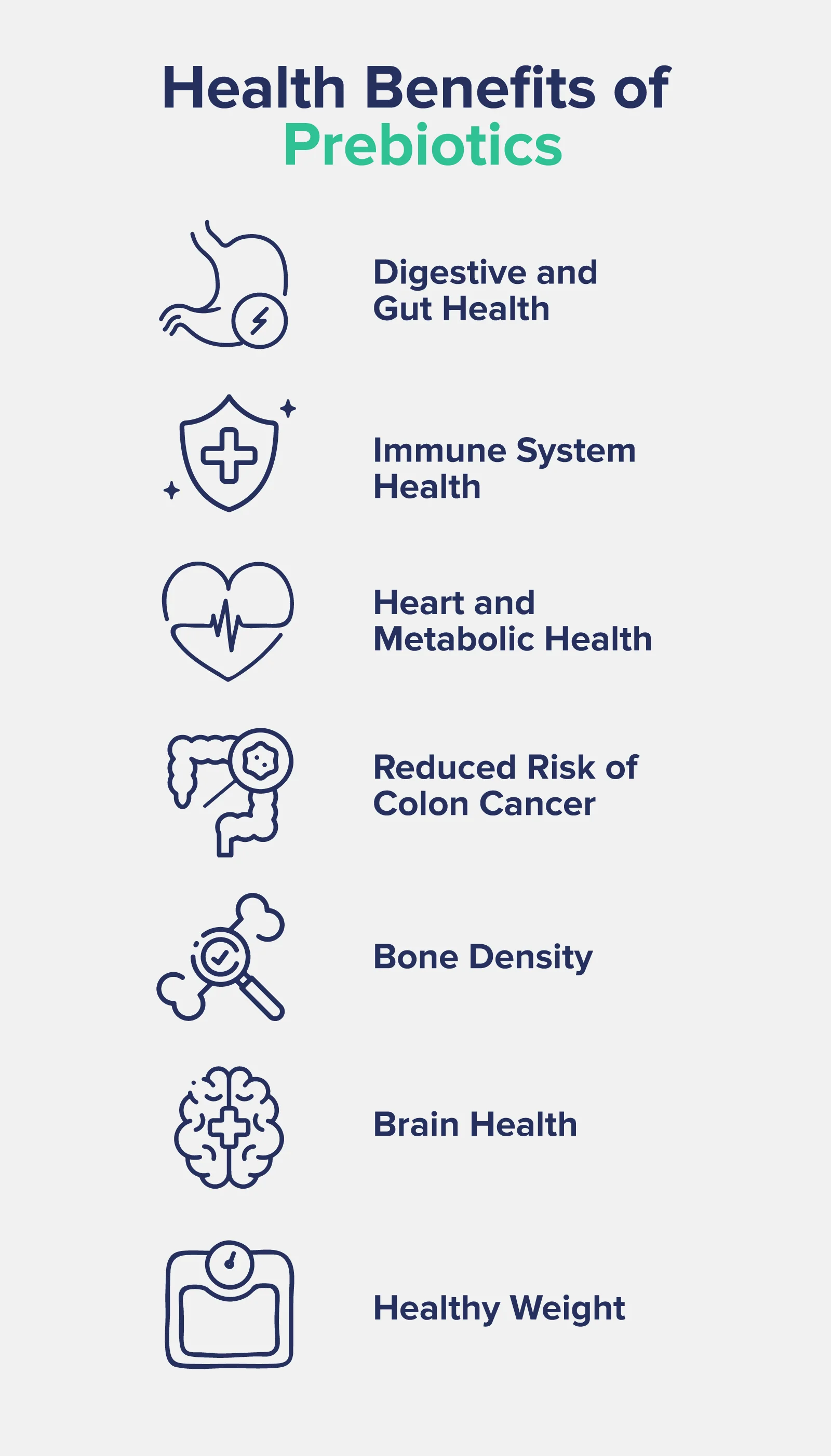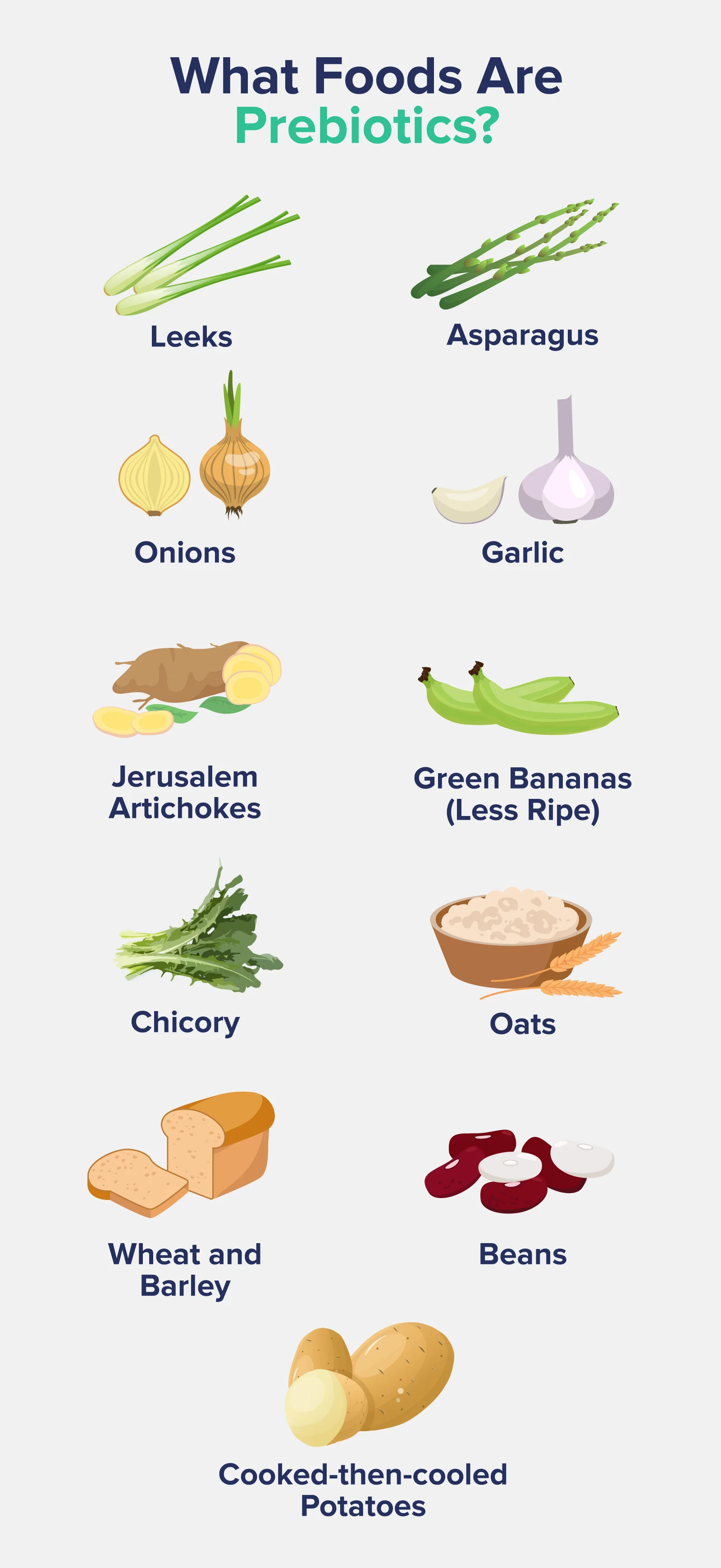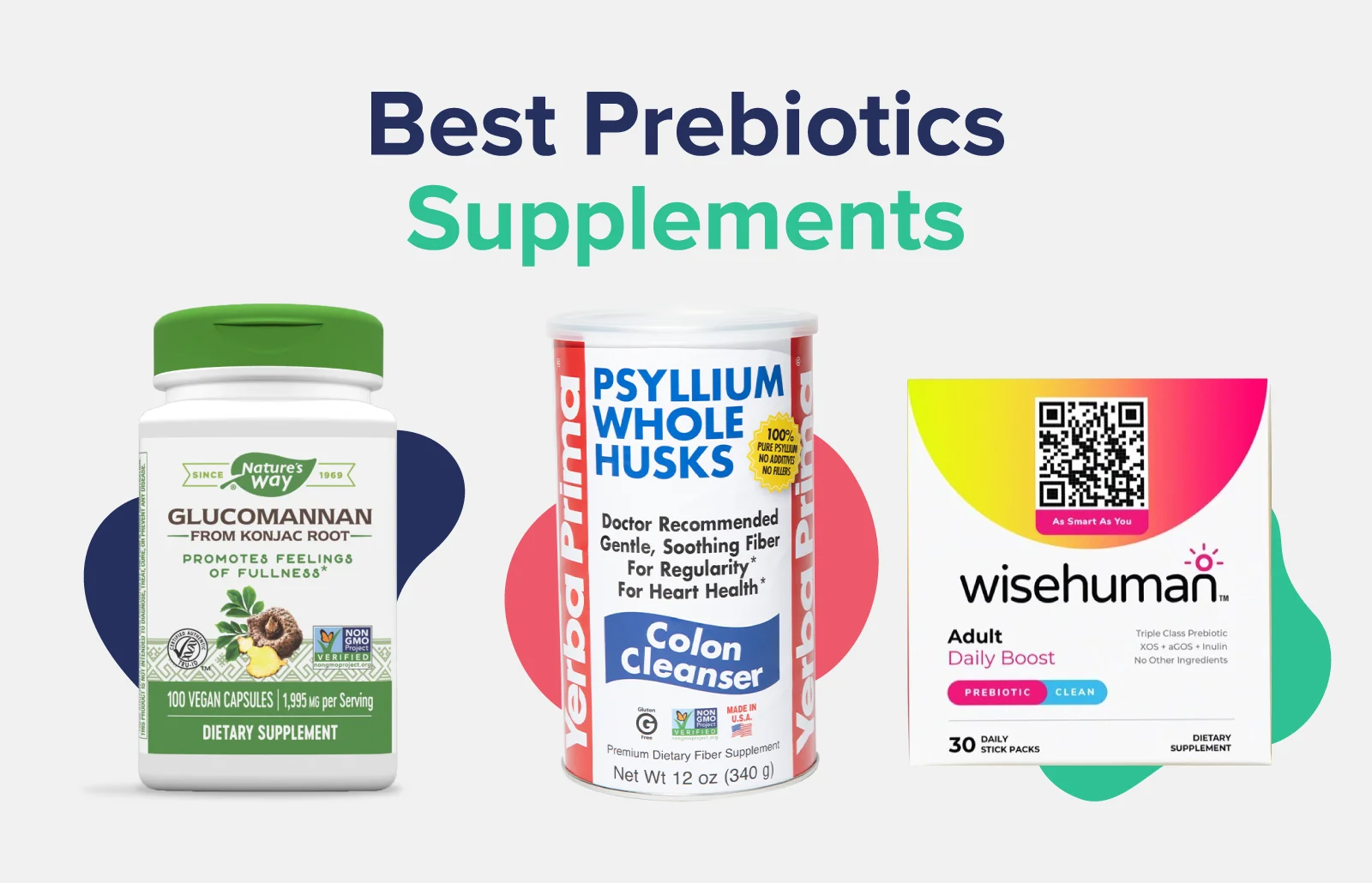Talk to a Registered Dietitian and use INSIDER20 for 20% off!
Talk to a real Dietitian for only $99: Schedule Now
This post contains links through which we may earn a small commission should you make a purchase from a brand. This in no way affects our ability to objectively critique the products and brands we review.
Evidence Based Research To fulfill our commitment to bringing our audience accurate and insightful content, our expert writers and medical reviewers rely on carefully curated research.
Read Our Editorial Policy
While you’re probably familiar with probiotics by now, prebiotics are a newer kid on the (gut health) block.
As a special type of dietary fiber, prebiotics provide a myriad of health benefits, especially for our digestive tract, immune system, metabolism and blood sugar, heart health, bone density, brain health, and more.
If you’ve been wondering what exactly prebiotics are, what they do in the body, and what foods and supplements they’re found in, this is the article for you.
Prebiotics are a type of fiber we eat that our healthy gut bacteria consume for energy.
Put simply, prebiotics are fuel for probiotics to grow and thrive in the gut.
For a technical definition, prebiotics are described as “nondigestible food ingredients that beneficially affect the host by selectively stimulating the growth and activity of bacteria in the colon, thus improving host health.”
Essentially, this means that prebiotics are types of dietary fiber that are not digested or absorbed by our digestive systems.
Rather than be digested by us, they are consumed and fermented by various microbes in the colon (large intestine).
When our colonic bacteria consume prebiotic fibers, these healthy microbes can grow and thrive in the gut, which benefits the host (us!).
Different types of gut bacteria use carbohydrate-hydrolyzing enzymes to break down and ferment prebiotic fibers, producing hydrogen, methane, carbon dioxide, lactate, and short-chain fatty acids, which we’ll get into in more detail in the next section.
In turn, these fermentation byproducts (also known as metabolites) provide energy for certain gut microbes to use, allowing them to continue living and growing in the colon and improving our health in various ways. Primarily, the breakdown of prebiotic fibers stimulates the growth of Bifidobacterium, a genus of beneficial bacteria known to improve gut health.
A primary reason why prebiotics are so beneficial to the gut—and many other areas of the body—is because they lead to the production of short-chain fatty acids.
Short-chain fatty acids (SCFAs) are beneficial fermentation byproducts known as metabolites that are produced when our intestinal bacteria feed on prebiotic fibers.
The three primary SCFAs are acetate, propionate, and butyrate, accounting for 90% of SCFAs produced by gut bacteria.
The other 10% of short-chain fatty acids produced in the gut are less-researched but include succinate, pentanoate, malonate, and valerate.
Colon cells in the gut’s epithelium (the thin layer of cells making up our gut lining) prefer to use butyrate as a fuel source (even more than glucose).
Butyrate is an essential nutrient that helps colonocytes (colon cells) grow and thrive, promoting normal colon cell growth, supporting healthy mucus production, and strengthening the intestinal barrier.
Therefore, having enough available butyrate (which comes from eating prebiotic fibers) may be a critical factor in protecting against colonic disorders.
SCFAs also lower pH in the gut, limiting the growth of harmful bacteria that cannot survive in lower-pH environments, and enhance the absorption of calcium and other minerals.

Have you ever heard the phrase, “You are what you eat.”?
Well, it really should be, “You are what your microbes eat,” as the potential health benefits that come from our gut bacteria “eating” prebiotic fibers are pretty monumental.
As we’ll see, prebiotics and their subsequent short-chain fatty acid production may even have more benefits than probiotics (gasp!), from improved bone density and blood sugar regulation to cognitive function and colon cancer reduction.
It’s well-known that dietary fiber is beneficial for digestive function, and prebiotic fiber is no exception.
Prebiotics may be particularly helpful for improving constipation.
This 2020 review found that a type of prebiotic fiber called inulin increased the frequency of bowel movements and improved stool consistency in people with IBS-C (irritable bowel syndrome with constipation).
The researchers also concluded that inulin fiber increased intestinal transit time (the time it takes for food to move through the digestive tract), which is great for people with constipation.
Consumption of prebiotic fiber has been shown to help people with the opposite problem as well, reducing the prevalence and duration of infectious and antibiotic-associated diarrhea.
However, the results are mixed when it comes to inflammatory bowel disease (IBD), which includes Crohn’s disease and ulcerative colitis.
While a few studies show that prebiotics improve some symptoms of inflammatory bowel disease (especially ulcerative colitis), many others find that they worsen IBD symptoms.
One study found that people with ulcerative colitis (UC) who supplemented with germinated barley foodstuff (yum) had clinical improvements to their disease, including reductions in bloody stools and nocturnal diarrhea.
Conversely, another showed that people with active Crohn’s disease who took FOS (fructooligosaccharides) prebiotics had significantly worse symptoms, leading to over one-quarter of them dropping out before the 4-week study ended.
As anyone with IBD knows, fiber is not ideal to consume when a flare is occurring. Therefore, it might be beneficial to consume prebiotics outside of disease flares (which could help to bolster the gut microbiome and its lining) but not during an active IBD flare.
This is seen in a small older study, where people with UC took the prebiotic isphagula husk for four months while they were in remission. Those taking the prebiotic had significantly greater clinical improvement rates and symptom management (69%) compared to the placebo group (24%).
Like IBD, high amounts of fiber (in any form) can cause painful digestive symptoms in some people with IBS.
The exact dose and type of prebiotics that improve digestive health are not yet known.
Consuming prebiotics in food (rather than supplements with higher doses) may be preferred for people with IBS because foods typically have smaller amounts of prebiotics than supplements.
When it comes to IBD, consuming more prebiotics during remission periods may help to reduce the risk of flares in the future—but whether or not you eat or take prebiotics during flares depends on your individual tolerance for fiber.
Prebiotics are thought to improve immune system function, as short-chain fatty acids (especially butyrate) act on various immune cells in the gut.
According to a review published in Current Opinions in Gastroenterology, short-chain fatty acids have been found to modulate the activity of several immune cells, including regulatory T cells, dendritic cells, and T lymphocytes.
Short-chain fatty acids also strengthen the barrier of the intestinal lining and help to produce antimicrobial peptides, which act as a physical line of defense against pathogens.
The short-chain fatty acid propionate is metabolized and used by the liver, where it can interfere with cholesterol production and lead to healthier blood cholesterol levels.
This may be one reason why high-fiber diets are known to lower cholesterol levels and reduce the risk of cardiovascular disease.
Other ways prebiotics and SCFAs benefit cardiometabolic health include improving blood sugar management (a leading risk factor for type 2 diabetes when dysregulated), reducing inflammation, and lowering blood pressure.
In a randomized controlled trial, women with type 2 diabetes were randomized to take inulin and oligofructose or a placebo for eight weeks. Those in the prebiotic group experienced several benefits related to cardiometabolic health, including:
Healthy activity of SCFAs in the gut—especially butyrate—is associated with a reduced risk of colon cancer.
In a review published in the journal Microorganisms, researchers state, “There is an increasing body of evidence describing the preventive effect of prebiotics on CRC [colorectal cancer].”
Butyrate has been shown to induce apoptosis (programmed cell death) of colon cancer cells and exhibit anti-tumor activity in laboratory studies, including inhibiting colorectal cancer cell proliferation.
While there is limited research with humans showing that butyrate (or prebiotic fiber) reduces the risk of or improves colon cancer, researchers state, “most studies have shown that an increase in SCFAs is relevant to a significant decrease in tumor loads.”
However, in a systematic review of nine clinical trials, only lactulose (a synthetically derived prebiotic) was found to positively affect markers of colorectal cancer, as it reduced adenoma recurrence. Other prebiotics, including resistant starch, inulin, and oligofructose, did not have an effect on any biomarkers of colorectal cancer.
Short-chain fatty acids are known to increase calcium absorption in the intestines, enhancing bone mineral density.
Non-digestible oligosaccharides are currently thought to be the most promising prebiotics for bone health, which include lactulose, galactooligosaccharides (GOS), fructooligosaccharides (FOS), oligofructose, and inulin.As discussed in this 2018 review, supplemental prebiotics of varying types have been found in clinical trials to reduce bone resorption, increase calcium absorption, and improve whole-body bone mineral density and bone mineral content.
Increasing evidence suggests that neurodegenerative disorders like Alzheimer’s and Parkinson’s disease are, in part, modulated by SCFA activity and the gut-brain axis.
Although there is no available research in humans, studies with animals have shown that giving a form of butyrate improves memory in mice with advanced stages of Alzheimer’s disease.
Researchers speculate that SCFAs like butyrate benefit the brain and central nervous system by influencing neurotrophic factors like BDNF (brain-derived neurotrophic factor), which helps facilitate neurogenesis—the growth and maintenance of new neurons. SCFAs also play a role in neurotransmitter communication and help to maintain the integrity of the blood-brain barrier.
Acetate (one of the SCFAs) is used by our brains, muscles, and tissues, and studies suggest that it benefits energy metabolism and is linked to appetite suppression and healthy body weight.
Because fiber is not digested, it is highly satiating—meaning it keeps us fuller for longer. The satiety factor (which is linked to appetite suppression) and the correction of gut dysbiosis are two potential reasons why prebiotics are linked to weight loss.
One small study with 48 overweight adults found that taking 21 grams of fructooligosaccharide prebiotics for 12 weeks led to significant weight loss compared to a control group.
The weight loss wasn’t much—the prebiotics group lost an average of 1.03kg (2.23 lbs)—but it was better than the control group that gained weight over the study.
A review published in Nutrients summarized the results from 13 human clinical trials assessing prebiotic supplementation and weight.
Some key results found were that prebiotics of varying types increased satiety, reduced hunger hormones and hunger itself, decreased total caloric intake, and reduced body weight, body fat, BMI, and waist circumference.
While there are prebiotic supplements you can take, these fibers are also found in many plant foods.

The types of prebiotic compounds found in these foods primarily include resistant starch, pectins, gums, non-digestible oligosaccharides (lactulose, galactooligosaccharides, fructooligosaccharides, oligofructose, and inulin), and sugar alcohols.
In supplement form, you may see prebiotics on labels as galactooligosaccharides (GOS), transgalactooligosaccharides (TOS), polydextrose, wheat dextrin, acacia gum, psyllium, potato starch, glucomannan, or inulin.
However, this list is not exhaustive, and there are many more types of supplemental prebiotic fiber.
Prebiotic supplements can help to bridge the gap if you do not consume enough prebiotic foods.
A full list of our top-rated prebiotic supplements can be found in this article: Best Prebiotics for Gut Health.
A few of our favorites include:

Synbiotics are supplements that combine prebiotics with probiotics. They can be beneficial to take because prebiotics are an energy source for probiotics. So, taking a synbiotic can help to maximize the synergistic effects of probiotics and prebiotics.
They can be particularly helpful if you don’t eat a high-fiber diet. In this case, choosing a synbiotic supplement instead of just a probiotic supplement can ensure that the beneficial gut bacteria have enough fuel to consume and can survive and thrive in your gut.
Some of our favorite synbiotic supplements that combine probiotics and prebiotics include:
Examples of prebiotics include:
• Leeks
• Asparagus
• Chicory
• Green bananas (less ripe)
• Jerusalem artichokes (sunchokes)
• Garlic
• Onions
• Certain whole grains like wheat and barley
• Oats
• Beans
• Cooked-then-cooled potatoes
No, prebiotics are not the same as probiotics. While probiotics are healthy bacteria that live in the colon, prebiotics are the fuel for said bacteria. Prebiotics are a type of dietary fiber that probiotic bacteria consume to stay alive and thrive.
While all prebiotics are dietary fibers, not all dietary fibers are also prebiotics. Both prebiotics and fiber are non-digestible carbohydrates that do not get broken down by our guts. However, not all fibers provide fuel for our intestinal cells like prebiotics do. Some types of dietary fiber, like insoluble cellulose fiber, provide bulk to stool and improve gut motility.
Some people avoid prebiotics because they can make their digestive symptoms worse. Prebiotics are a type of fermentable fiber, meaning they can produce gas in the digestive tract and cause uncomfortable symptoms like bloating or abdominal pain. Most prebiotics are high in FODMAPs (fermentable oligosaccharides, disaccharides, monosaccharides, and polyols), which some people experience digestive problems with after eating.
People with digestive disorders (like IBS and IBD) may or may not experience negative side effects from prebiotics.
Prebiotics can be bad for people with irritable bowel syndrome (IBS), but it is highly individualized. People with IBS-C (constipation-dominant) may experience more benefits from prebiotics than people with IBS-D (diarrhea-dominant). However, studies have also shown that prebiotics can help with diarrhea in certain cases.
Overall, you may need to determine your individual tolerance for prebiotics. As prebiotics are known to improve digestive health in the long run, consider eating or taking prebiotics during asymptomatic periods to bolster your gut microbiome and, hopefully, reduce symptoms in the future. Prebiotics made from galacto-oligosaccharides, including partially hydrolyzed guar gum or pectin, are more likely to be tolerated if you have IBS. The same advice goes for people with IBD (ulcerative colitis and Crohn’s disease), although these people tend to be more sensitive to fiber—especially during flares.
Aliasgharzadeh A, Khalili M, Mirtaheri E, et al. A Combination of Prebiotic Inulin and Oligofructose Improve Some of Cardiovascular Disease Risk Factors in Women with Type 2 Diabetes: A Randomized Controlled Clinical Trial. Adv Pharm Bull. 2015;5(4):507-514. doi:10.15171/apb.2015.069
Bărboi OB, Ciortescu I, Chirilă I, Anton C, Drug V. Effect of inulin in the treatment of irritable bowel syndrome with constipation (Review). Exp Ther Med. 2020;20(6):185. doi:10.3892/etm.2020.9315
Benjamin JL, Hedin CR, Koutsoumpas A, et al. Randomised, double-blind, placebo-controlled trial of fructo-oligosaccharides in active Crohn’s disease. Gut. 2011;60(7):923-929. doi:10.1136/gut.2010.232025
Bordonaro M. Further analysis of p300 in mediating effects of Butyrate in Colorectal Cancer Cells. J Cancer. 2020;11(20):5861-5866. Published 2020 Aug 8. doi:10.7150/jca.47160
Cerdó T, García-Santos JA, G Bermúdez M, Campoy C. The Role of Probiotics and Prebiotics in the Prevention and Treatment of Obesity. Nutrients. 2019;11(3):635. Published 2019 Mar 15. doi:10.3390/nu11030635
Frei R, Akdis M, O’Mahony L. Prebiotics, probiotics, synbiotics, and the immune system: experimental data and clinical evidence. Curr Opin Gastroenterol. 2015;31(2):153-158. doi:10.1097/MOG.0000000000000151
Govindarajan N, Agis-Balboa RC, Walter J, Sananbenesi F, Fischer A. Sodium butyrate improves memory function in an Alzheimer’s disease mouse model when administered at an advanced stage of disease progression. J Alzheimers Dis. 2011;26(1):187-197. doi:10.3233/JAD-2011-110080
Haghikia A, Zimmermann F, Schumann P, et al. Propionate attenuates atherosclerosis by immune-dependent regulation of intestinal cholesterol metabolism. Eur Heart J. 2022;43(6):518-533. doi:10.1093/eurheartj/ehab644
Hallert C, Kaldma M, Petersson BG. Ispaghula husk may relieve gastrointestinal symptoms in ulcerative colitis in remission. Scand J Gastroenterol. 1991;26(7):747-750. doi:10.3109/00365529108998594
Hernández MAG, Canfora EE, Jocken JWE, Blaak EE. The Short-Chain Fatty Acid Acetate in Body Weight Control and Insulin Sensitivity. Nutrients. 2019;11(8):1943. Published 2019 Aug 18. doi:10.3390/nu11081943
Hu T, Wu Q, Yao Q, Jiang K, Yu J, Tang Q. Short-chain fatty acid metabolism and multiple effects on cardiovascular diseases. Ageing Res Rev. 2022;81:101706. doi:10.1016/j.arr.2022.101706
Kanauchi O, Mitsuyama K, Homma T, et al. Treatment of ulcerative colitis patients by long-term administration of germinated barley foodstuff: multi-center open trial. Int J Mol Med. 2003;12(5):701-704.
Kaźmierczak-Siedlecka K, Marano L, Merola E, Roviello F, Połom K. Sodium butyrate in both prevention and supportive treatment of colorectal cancer. Front Cell Infect Microbiol. 2022;12:1023806. Published 2022 Oct 26. doi:10.3389/fcimb.2022.1023806
Mahdavi M, Laforest-Lapointe I, Massé E. Preventing Colorectal Cancer through Prebiotics. Microorganisms. 2021;9(6):1325. Published 2021 Jun 18. doi:10.3390/microorganisms9061325
Parnell JA, Reimer RA. Weight loss during oligofructose supplementation is associated with decreased ghrelin and increased peptide YY in overweight and obese adults. Am J Clin Nutr. 2009;89(6):1751-1759. doi:10.3945/ajcn.2009.27465
Silva YP, Bernardi A, Frozza RL. The Role of Short-Chain Fatty Acids From Gut Microbiota in Gut-Brain Communication. Front Endocrinol (Lausanne). 2020;11:25. Published 2020 Jan 31. doi:10.3389/fendo.2020.00025
Slavin J. Fiber and prebiotics: mechanisms and health benefits. Nutrients. 2013;5(4):1417-1435. Published 2013 Apr 22. doi:10.3390/nu5041417
Suganya K, Koo BS. Gut-Brain Axis: Role of Gut Microbiota on Neurological Disorders and How Probiotics/Prebiotics Beneficially Modulate Microbial and Immune Pathways to Improve Brain Functions. Int J Mol Sci. 2020;21(20):7551. Published 2020 Oct 13. doi:10.3390/ijms21207551
Whisner CM, Castillo LF. Prebiotics, Bone and Mineral Metabolism. Calcif Tissue Int. 2018;102(4):443-479. doi:10.1007/s00223-017-0339-3